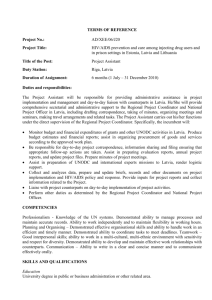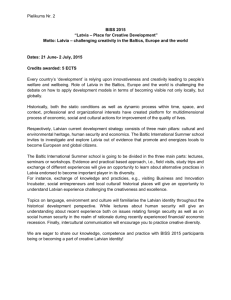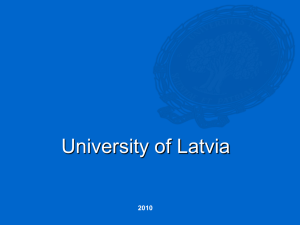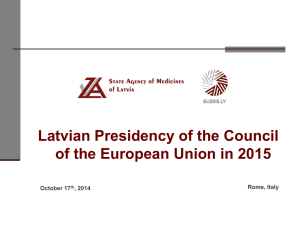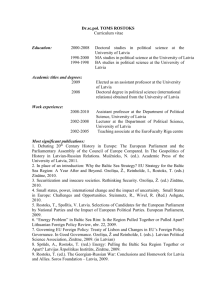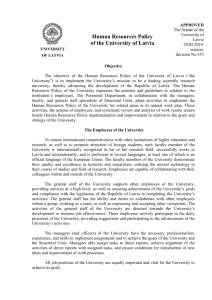The Software Industry – a Potential Driving Force for Latvian Exports
advertisement
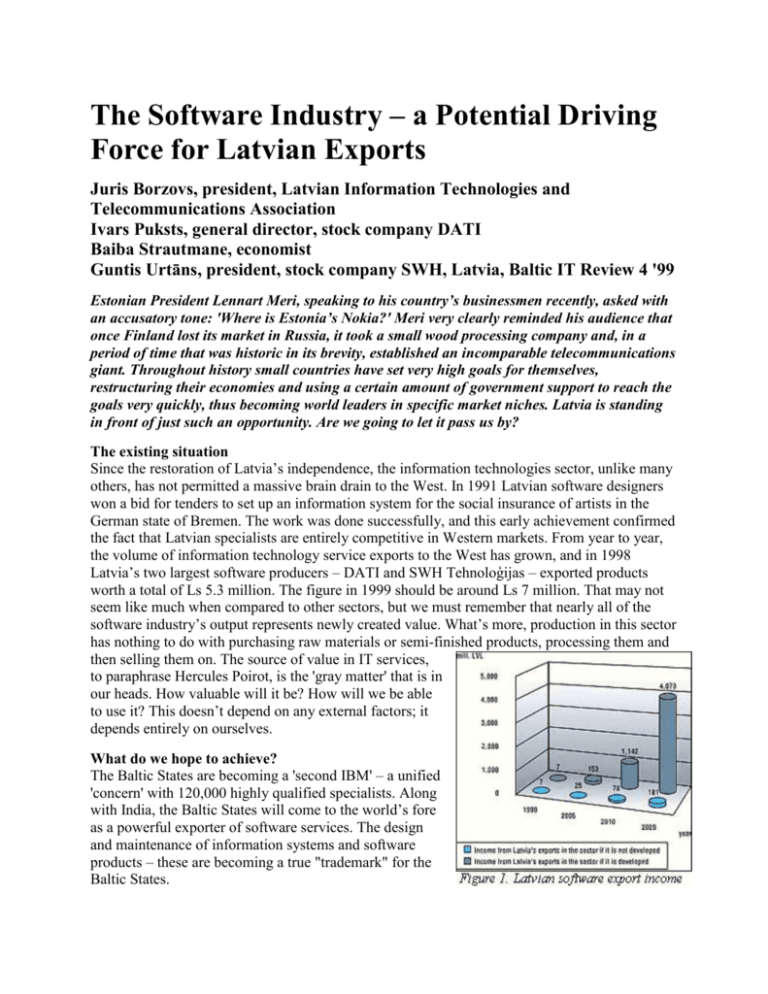
The Software Industry – a Potential Driving Force for Latvian Exports Juris Borzovs, president, Latvian Information Technologies and Telecommunications Association Ivars Puksts, general director, stock company DATI Baiba Strautmane, economist Guntis Urtāns, president, stock company SWH, Latvia, Baltic IT Review 4 '99 Estonian President Lennart Meri, speaking to his country’s businessmen recently, asked with an accusatory tone: 'Where is Estonia’s Nokia?' Meri very clearly reminded his audience that once Finland lost its market in Russia, it took a small wood processing company and, in a period of time that was historic in its brevity, established an incomparable telecommunications giant. Throughout history small countries have set very high goals for themselves, restructuring their economies and using a certain amount of government support to reach the goals very quickly, thus becoming world leaders in specific market niches. Latvia is standing in front of just such an opportunity. Are we going to let it pass us by? The existing situation Since the restoration of Latvia’s independence, the information technologies sector, unlike many others, has not permitted a massive brain drain to the West. In 1991 Latvian software designers won a bid for tenders to set up an information system for the social insurance of artists in the German state of Bremen. The work was done successfully, and this early achievement confirmed the fact that Latvian specialists are entirely competitive in Western markets. From year to year, the volume of information technology service exports to the West has grown, and in 1998 Latvia’s two largest software producers – DATI and SWH Tehnoloģijas – exported products worth a total of Ls 5.3 million. The figure in 1999 should be around Ls 7 million. That may not seem like much when compared to other sectors, but we must remember that nearly all of the software industry’s output represents newly created value. What’s more, production in this sector has nothing to do with purchasing raw materials or semi-finished products, processing them and then selling them on. The source of value in IT services, to paraphrase Hercules Poirot, is the 'gray matter' that is in our heads. How valuable will it be? How will we be able to use it? This doesn’t depend on any external factors; it depends entirely on ourselves. What do we hope to achieve? The Baltic States are becoming a 'second IBM' – a unified 'concern' with 120,000 highly qualified specialists. Along with India, the Baltic States will come to the world’s fore as a powerful exporter of software services. The design and maintenance of information systems and software products – these are becoming a true "trademark" for the Baltic States. This is a goal that can realistically be fulfilled in 10-20 years. Latvian IT companies, as a result of exporting their services, will reach turnover of Ls 4 billion each year, while the three Baltic States in total can reach a level of Ls 12 billion. What’s more, the exports will be aimed at the West, not the still-uncertain Eastern marketplace. Given the enormous proportion of new or added value created by this sector, this is a very promising area of the national economy when it comes to improving the overall situation and the welfare of the people. Naturally, the budget of the Republic of Latvia will receive considerable sums in taxes. The IT sector is environmentally friendly, it requires no industrial raw materials, it does not create any production waste, and it consumes little in the way of energy resources. Latvia and the other Baltic countries will "import" only money, and this will stimulate increasing professional qualifications. The sector will support the development of economically backward regions, because software design workplaces can be put anywhere where there are available telephone communications. Young people will be stimulated, because given the salaries in the sector, employees will be able to live as prosperously in Latvia as they would anywhere else. Are these empty fantasies? Judge for yourselves. These visions of the future are based on a few fundamental considerations that can easily be proven: • First of all, demand for information technology services that is fully based in purchasing power is rapidly on the rise in the world’s developed countries, and, paradoxically, this is happening even as the number of people graduating from university with this particular specialty is declining. According to various studies, there is a shortfall of between 130,000 and 500,000 software specialists in the world right now, and the deficit may increase to some 1 million people over the course of the next 5-10 years. • Secondly, when Latvia joins the European Union, the prices of goods and services will inevitably even out. Because of the aforementioned labor deficit, and also because the stability and product quality of Latvian IT companies is on the rise, the prices in the IT sector should reach European levels even sooner. In the case of a few projects, this has happened already. • Third, we believe that more and more young people will choose software design and related professions in Latvia, and our universities will be able to educate everyone who wants to pursue the field. The state will provide financial support to universities and students by increasing budget financing, expanding the range of available credits for students, and by stimulating businesses to invest in education and to create new jobs. Initially it would be enough if universities were ready to accept the approximately 1,200 potential students who passed entrance examinations this year, and if at least two-thirds of them managed to finish their studies on schedule. Right now, however, universities are suffering from a lack of financing, facilities and instructors, and they can accept only about one-half of those who apply. Furthermore, only some one-third of students actually end up completing their degrees, probably because of economic problems. Fourth, we have proof that Latvia’s universities are capable of preparing computer specialists and software designers, as well as other information technology and telecommunications specialists, at a very high level. There are four computer manufacturers and two software companies in Latvia that have already obtained the ISO 9001 certificate, and this provides evidence of their conformity to international quality requirements. We are convinced that all of the foregoing is entirely possible, but it cannot happen of itself. Where to begin? Because the cornerstone of software design is a well-educated and skilful engineer, while computers and other equipment are simply necessary instruments that can do nothing by themselves, it is clear that the main reason why we cannot reach our ambitious goals today is the insufficiency of educated and motivated employees. this means that the first step must be a radical increase in the educational opportunities that exist in this particular sector. The number of university graduates in the IT field must be expanded rapidly – by three, or preferably by six times. Businesses in the IT field understand very well the significance of a good education, and they support various ways of obtaining that education. They pay scholarships to the best students, they let their employees present lectures at universities, they organize student conferences and academic project competitions, and they support the participation of Latvian schoolchildren in local and international informatics Olympiads. The stock company DATI and the Hansabank bank have recently begun to provide loans to students. We cannot hope, however, that Latvia’s companies will be able to shoulder the entire financial burden associated with the education of specialists, because companies must invest all of their free resources in expanding production and in creating new jobs. Our calculations suggest that the state must provide 2 million lats more to the education of information technology specialists than is the case right now. Another million is needed to provide loans for students in these fields. To do or not to do? This is a question addressed to Latvia’s government, Parliament and young people. If the gradual level of development that has been occurring so far is allowed to continue, then in the year 2020 we will have an IT sector in Latvia in which the number of export-oriented workers will be no more than 1,000, and export income each year will be no more than about 160 million lats. That’s not bad, of course, and the Latvian government doesn’t have to take radical steps which may initially be unpopular and seem socially unjust in order to structure the national economy and to specify priority sectors. We can say, of course – and people often say this – that there must be a level playing field for all businesses, but the fact is that the country’s budget resources are what they are, and if financing remains at the low level to which everyone is accustomed, it won’t be very good for anyone. It’s also true that the establishment of Free Economic Zones in Latvia has already eliminated total equality in business activities. Parliament and the Cabinet of Ministers will require enormous economic wisdom and political courage indeed to adopt a decision that is favorable to a relatively narrow sector under conditions of an overall budget deficit, and to explain that decision to society in an understandable way. The fact is, however, that there is no other sector in Latvia – and it is quite possible that it will never have one – that can repay all of the investment made in it in just a few years’ time, and in the future the sector will support other sectors and the social sphere with growing tax payments. If we want to see Latvia as one of the developed countries of Europe, one in which our successors will live, we must cast aside doubt, laziness and cowardice, and with the harmonized efforts of legislators, the government, universities and businesses, we must develop without any delay a sector through which Latvia and its sister countries of Estonia and Lithuania will become known throughout the world. If we don’t waste this opportunity, the export of software services in three to five years’ time will convincingly be among Latvia’s eight leading export sectors, and in the year 2020 it will be an unquestioned export leader, providing work to some 40,000 people and earning some Ls 4 billion each year. The taxes paid by companies and employees in the sector will allow other sectors – culture, education, health care and the pension system – to bloom.
